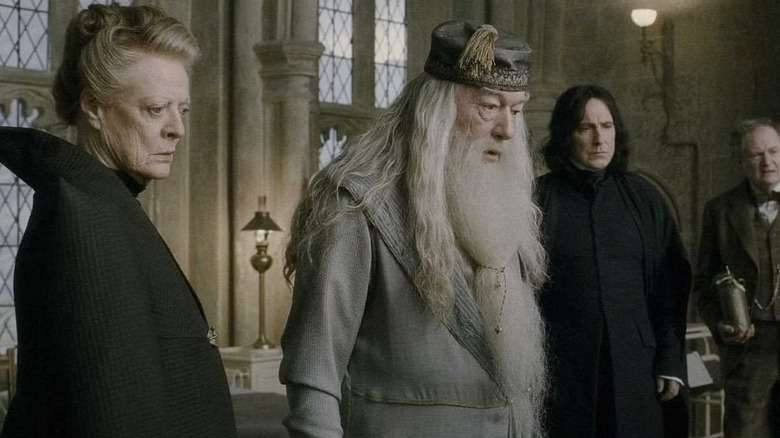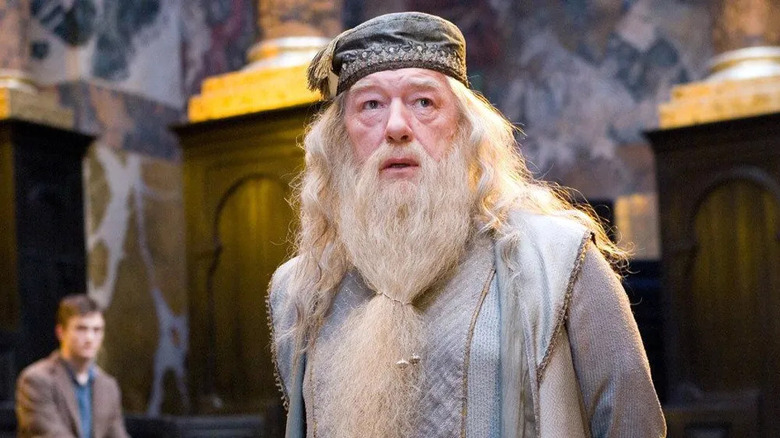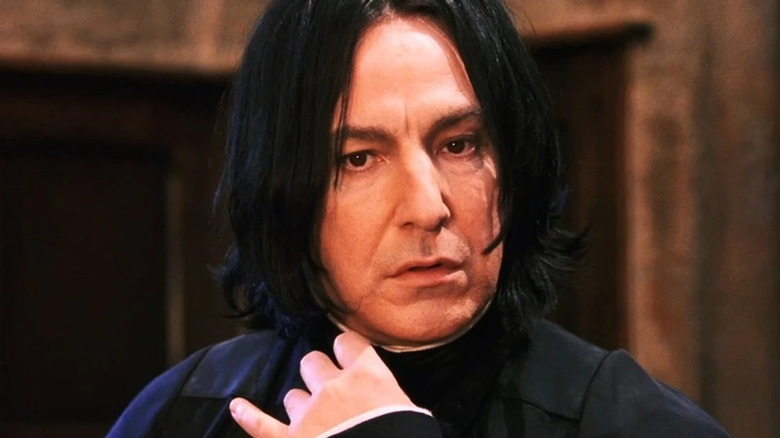Harry Potter: Who Becomes Headmaster Of Hogwarts After Dumbledore & Snape?
It's a tricky job, being headmaster of Hogwarts School of Witchcraft and Wizardry. At any given time, you've got a bunch of young magical minds to mold and shape so that future generations know their Disarming Spells from their Summoning Charms. Also, this is an incredibly dangerous school, so you might deal with any number of intrusions throughout the school year, like a potentially deadly magical tournament, interference from the Ministry of Magic, a serial killer on the loose, a bunch of joy-sucking dementors floating around, a basilisk living in the pipes... or you could agree to let the school house the Philosopher's Stone, which grants eternal life.
All of this is to say that running Hogwarts isn't exactly an easy gig, and as such, it can only fall to the best and the brightest. When readers and audiences first travel to Hogwarts with young Harry Potter — played on screen by Daniel Radcliffe — he's introduced to the wise, eccentric, and friendly Albus Dumbledore (played by Richard Harris and then Michael Gambon after the former's death), the school's current headmaster. Dumbledore, after his death, is followed by Severus Snape (Alan Rickman), the guy who killed him — and after Snape leaves the school under duress, the job finally falls to Minerva McGonagall (Maggie Smith), Dumbledore's long-time right-hand woman.
Dumbledore's tenure is long but fraught...
Albus Dumbledore is the very first headmaster of Hogwarts seen in either the books or films — and in many ways, he sets a pretty high standard. He seems accessible, friendly, and even whimsical, but there's no question that he's a very powerful wizard, and it's widely known that he even strikes fear into the heart of the Dark Lord Voldemort (later portrayed by Ralph Fiennes). He more or less immediately becomes a mentor and confidante to Harry after, at just eleven years old, the Boy Who Lived thwarts Voldemort for the second time in his life, and the two end up working closely together to fight the seemingly endless forces of evil that end up invading Hogwarts.
There's a distance between Harry and Dumbledore after Voldemort's return in "Goblet of Fire," chiefly because the older wizard is concerned that Voldemort will be able to access Harry's mind through their mysterious connection and manipulate Dumbledore. After they clear that up in "Order of the Phoenix," though, they team up for the last time to track down Voldemort's Horcruxes, meaning the pieces of his soul he's scattered to obtain a temporary reprieve from death... until, when Dumbledore is weakened by one of their missions, he and Harry arrive back at Hogwarts, and Snape kills Dumbledore.
...whereas Snape's time as headmaster was short and not so sweet
Despite the fact that Snape and Dumbledore actually had a deal where the former would kill the latter — Dumbledore was terminally ill, and having Snape take his life would save him from a painful death as well as get Draco Malfoy (Tom Felton), ordered to kill Dumbledore by Voldemort himself, off the hook — it doesn't look great for the Potions master. He runs from Hogwarts in the initial aftermath and McGonagall temporarily takes over as headmaster, but when Voldemort quietly takes over the wizarding world by controlling the Minister of Magic in secret, he installs Snape as the new headmaster of the school.
What Voldemort doesn't know, though, is that Snape isn't really working for him; he's still working on Dumbledore's orders, communicating with the late headmaster through the enchanted portrait earned by all Hogwarts headmasters. This ultimately leads to Snape's death when Voldemort murders him in cold blood in hopes of obtaining true ownership of the Elder Wand, the all-powerful wand once owned by Dumbledore, and it's only then that Harry learns the truth about Snape. After both Snape and Dumbledore die in the line of duty as headmaster, McGonagall takes over for good, and is still headmaster during "Harry Potter and the Cursed Child."


